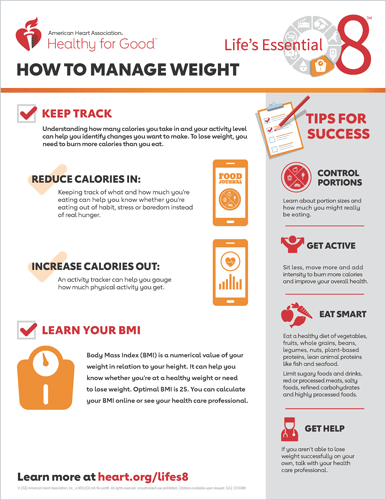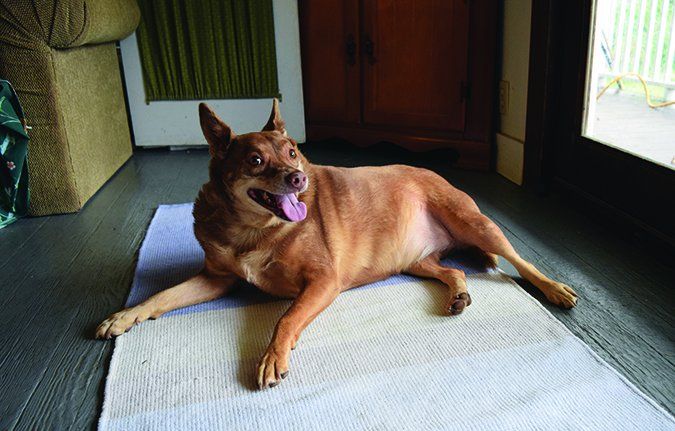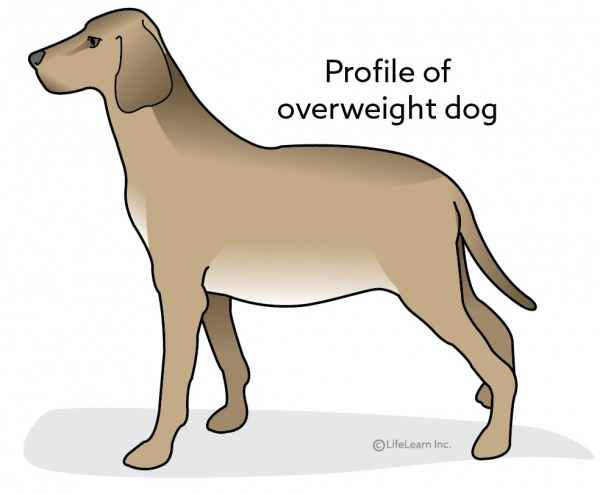To help your dog gain weight, you can feed them protein and fat-rich foods such as poultry, leafy green vegetables, seeds, nuts, and certain vegetable oils. You can also try adding peanut butter, coconut oil, sweet potatoes, or pumpkin to their diet.
Just make sure to monitor the amount and avoid excessive protein intake. Additionally, choosing a calorie-dense, high-quality dog food that contains real meat can also help with weight gain. Homemade formulas that are low in carbohydrates and high in protein and fatty acids, like the Beef & Russet recipe, can be beneficial as well.
Ultimately, the optimal weight gain diet for dogs should include lean meats, healthy fats, and nutrient-dense ingredients.

Credit: www.heart.org
Understanding The Reasons For A Dog’s Underweight
Understanding the reasons for a dog’s underweight can help in determining what to give them to gain weight. Incorporating protein and fat-rich foods such as poultry, leafy green vegetables, seeds, nuts, and oils like grapeseed and sunflower can help meet their weight gain goals.
Adding extras like peanut butter or pumpkin to their regular diet can also aid in healthy weight gain.
Evaluating Your Dog’s Current Weight
Before addressing the issue of underweight in dogs, it is important to evaluate your furry friend’s current weight. A visual assessment can be helpful in determining if your dog is underweight or not. Place your hands on the sides of your pet’s chest and run them along the ribcage. If you can easily feel the ribs without applying pressure, this may indicate that your dog is underweight.
Another way to evaluate your dog’s weight is by using a weight chart specific to their breed. These charts provide a general guideline of what a healthy weight range should be for different dog breeds. By referring to these charts, you can determine if your dog is underweight or falls within the healthy weight range.
Important: Determining if your dog is underweight or not may require the assistance of a veterinarian, as they have the expertise to accurately assess your pet’s health and provide personalized recommendations.
Identifying Potential Underlying Health Issues
There are several potential underlying health issues that can contribute to a dog’s underweight condition. Identifying these issues is crucial if you want to help your dog gain weight effectively.
Here are some common health problems that can cause weight loss in dogs:
- Parasite infestations, such as worms, fleas, or ticks, which can affect your dog’s ability to absorb nutrients properly.
- Dental problems, such as gum disease or tooth decay, which can make it difficult for your dog to eat and chew their food.
- Gastrointestinal disorders, including irritable bowel disease, pancreatitis, or food allergies, which can lead to poor digestion and absorption of nutrients.
- Metabolic disorders, such as thyroid or kidney issues, which can affect your dog’s metabolism and result in weight loss.
Important: Identifying these potential health issues requires professional advice from a qualified veterinarian. They will conduct a thorough examination and may perform additional tests to determine the cause of your dog’s underweight condition.
Consulting With A Veterinarian
When it comes to addressing your dog’s underweight condition, it is crucial to consult with a veterinarian. A licensed veterinarian is the best resource to guide you through this process and provide you with a tailored plan to help your furry friend gain weight.
During the veterinary consultation, the veterinarian will:
- Conduct a comprehensive examination to assess your dog’s overall health and identify any underlying medical conditions.
- Review your dog’s medical history, including any previous illnesses, medications, or changes in appetite or behavior.
- Provide nutritional advice specific to your dog’s needs, including recommending a balanced and calorie-dense diet to promote healthy weight gain.
- Suggest any necessary diagnostic tests, such as blood work or fecal examinations, to rule out any underlying health issues.
- Monitor your dog’s progress regularly and make adjustments to the weight gain plan if necessary.
Note: It is essential to follow your veterinarian’s advice and guidance throughout the weight gain journey. They have the expertise and experience to ensure your dog’s health is prioritized and that the weight gain process is safe and effective.

Credit: www.whole-dog-journal.com
Effective Strategies To Help A Dog Gain Weight
When it comes to helping your dog gain weight, there are several effective strategies you can implement. These strategies include choosing a high-quality calorie-dense dog food, incorporating protein-rich foods in the diet, and adding healthy fats to the dog’s meals. Let’s explore each of these strategies in detail:
Choosing A High-quality Calorie-dense Dog Food
One of the first steps to help your dog gain weight is to choose a high-quality dog food that is calorie-dense. Look for dog food brands that contain real meat as the first ingredient and have a high protein and fat content. This will provide your dog with the necessary nutrients and calories required for weight gain. Avoid dog foods that contain fillers and artificial ingredients, as they may not provide the necessary nutrition your dog needs.
Incorporating Protein-rich Foods In The Diet
Protein plays a crucial role in helping a dog gain weight. Incorporating protein-rich foods into your dog’s diet can help promote muscle growth and weight gain. Some protein-rich foods you can include in your dog’s meals are lean meats, such as chicken and turkey, cottage cheese, and eggs. These foods are not only high in protein but also provide essential amino acids that support overall health and weight gain.
Adding Healthy Fats To The Dog’s Meals
Another effective strategy to help your dog gain weight is by adding healthy fats to their meals. Fats are a concentrated source of calories and can contribute to weight gain. Some healthy fat options you can include in your dog’s meals are peanut butter, coconut oil, and fish oil. These fats not only provide calorie-dense nutrition but also offer additional health benefits, such as promoting a healthy coat and supporting joint health.
In addition to incorporating these strategies, it’s important to ensure that you consult with your veterinarian before making any significant changes to your dog’s diet. They can provide personalized recommendations based on your dog’s specific needs and health conditions. By following these effective strategies and providing your dog with the necessary nutrients, you can help them achieve a healthy weight.
Additional Tips And Considerations
Looking to help your dog gain weight? Consider incorporating protein and fat-rich foods like poultry, leafy green vegetables, seeds, nuts, and healthy oils into their diet. Additionally, you can try mixing peanut butter, pumpkin, and coconut oil together to create high-calorie treats.
Gaining weight in a healthy and controlled manner is crucial for your dog’s overall well-being. In addition to incorporating the right foods into their diet, there are a few other tips and considerations that can help support your dog’s weight gain journey.
Feeding Multiple Small Meals Throughout The Day
Instead of sticking to traditional feeding schedules, consider feeding your dog multiple small meals throughout the day. This approach can help stimulate their appetite and provide more frequent nutrient intake, allowing for better absorption and digestion. Additionally, it helps prevent overfeeding during meal times, reducing the risk of digestive issues. Aim for at least three to four small meals spread out evenly throughout the day.
Avoiding Excessive Treats And Table Scraps
While it may be tempting to reward your dog with treats or share table scraps to encourage weight gain, it’s important to avoid excessive indulgence. Treats and table scraps are often high in calories, but they lack the essential nutrients needed for a balanced diet. Instead, focus on providing nutrient-dense, calorie-rich meals. If you do wish to give treats, opt for healthy alternatives such as small pieces of cooked chicken or low-fat dog treats.
Monitoring The Dog’s Weight Gain Progress
Regularly monitoring your dog’s weight gain progress is essential to ensure that they are on the right track. Keep a record of their weight and body condition score, and consult with your veterinarian regularly to assess their progress. It’s important to ensure that the weight gain is steady and gradual, rather than sudden and excessive. Adjust their diet or feeding routine accordingly to maintain a healthy weight gain rate.
In conclusion, additional tips and considerations such as feeding multiple small meals throughout the day, avoiding excessive treats and table scraps, and monitoring the dog’s weight gain progress can greatly support your efforts to help your dog gain weight in a healthy and controlled manner.

Credit: vcahospitals.com
Frequently Asked Questions On What Can I Give My Dog To Gain Weight
What Can I Feed My Dog To Gain Weight Fast?
To help your dog gain weight fast, feed them high-protein and high-fat foods such as poultry, leafy green vegetables, seeds, nuts, vegetable oils, peanut butter, coconut oil, sweet potatoes, and pumpkin. Avoid excessive protein and choose calorie-dense dog food that contains real meat.
Additionally, adding human foods like peanut butter or pumpkin to their regular diet can also aid in weight gain.
How Can I Add Fat To My Dog’s Diet?
To add fat to your dog’s diet, you can include poultry, leafy green vegetables, seeds, nuts, and some vegetable oils like grapeseed, sunflower, corn, and canola oil. Peanut butter, coconut oil, and treats are also helpful but should be given in moderation.
Sweet potatoes and pumpkin can also aid weight gain in a healthy way. Choose calorie-dense and protein-rich dog food and consider adding human foods like peanut butter or pumpkin to their meals.
Can Rice Help A Dog Gain Weight?
Rice can help a dog gain weight as it is a calorie-dense food that is easy to digest. It can be added to their regular meals to increase calorie intake.
Does Peanut Butter Help Dogs Gain Weight?
Peanut butter can help dogs gain weight as it is high in good fats. However, it’s important to monitor the amount given to avoid digestive upset. Mixing peanut butter, pumpkin, and coconut oil can be a beneficial treat. Sweet potatoes and pumpkin are also healthy options to help dogs gain weight.
Conclusion
If you’re wondering what you can give your dog to gain weight, consider incorporating protein and fat-rich foods into their diet. Poultry, leafy green vegetables, seeds, nuts, vegetable oils, and treats like peanut butter and coconut oil-based snacks can all help in achieving weight gain goals.
Additionally, using ingredients like sweet potatoes and pumpkin can promote healthy weight gain for your furry friend. Remember to choose high-quality dog food that is calorie-dense and contains real meat as well. With these tips, you can support your dog’s weight gain journey in a safe and effective manner.



